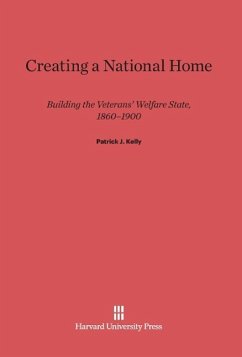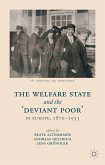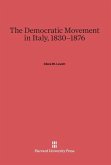For tens of thousands of Union veterans, Patrick Kelly argues, the Civil War never ended. Many Federal soldiers returned to civilian life battling the lifelong effects of combat wounds or wartime disease. Looking to the federal government for shelter and medical assistance, war-disabled Union veterans found help at the National Home for Disabled Volunteer Soldiers. Established by Congress only weeks prior to the Confederate surrender, this network of federal institutions had assisted nearly 100,000 Union veterans by 1900. The National Home is the direct forebear of the Veterans Administration hospital system, today the largest provider of health care in the United States.
Kelly places the origins of the National Home within the political culture of U.S. state formation. Creating a National Home examines Congress's decision to build a federal network of soldiers' homes. Kelly explores the efforts of the Home's managers to glean support for this institution by drawing upon the reassuring language of domesticity and "home." He also describes the manner in which the creators of the National Homes used building design, landscaping, and tourism to integrate each branch into the cultural and economic life of surrounding communities, and to promote a positive image of the U.S. state.
Drawing upon several fields of American history--political, cultural, welfare, gender--Creating a National Home illustrates the lasting impact of war on U.S. state and society. The building of the National Home marks the permanent expansion of social benefits offered to citizen-veterans. The creation of the National Home at once defined an entitled group and prepared the way for the later expansion of both the welfare and the warfare states.
Kelly places the origins of the National Home within the political culture of U.S. state formation. Creating a National Home examines Congress's decision to build a federal network of soldiers' homes. Kelly explores the efforts of the Home's managers to glean support for this institution by drawing upon the reassuring language of domesticity and "home." He also describes the manner in which the creators of the National Homes used building design, landscaping, and tourism to integrate each branch into the cultural and economic life of surrounding communities, and to promote a positive image of the U.S. state.
Drawing upon several fields of American history--political, cultural, welfare, gender--Creating a National Home illustrates the lasting impact of war on U.S. state and society. The building of the National Home marks the permanent expansion of social benefits offered to citizen-veterans. The creation of the National Home at once defined an entitled group and prepared the way for the later expansion of both the welfare and the warfare states.
Broken down in health and facing poverty and homelessness, 100,000 Union veterans sought refuge in a network of national soldiers' homes in the decades after the Civil War. In writing the history of this phenomenon, Kelly relates its development to a variety of important themes in current history and sociology...Clearly and cogently Kelly argues that the entitlements provided Civil War veterans enhanced the image of government, preparing the way for the dominant role of the federal bureaucracy in the 20th century. A model monograph, imaginative and wide-ranging, thoroughly researched in both primary and secondary sources, this work is highly recommended for academic libraries.
A lively and well-documented book that fills an important niche in the history of the American welfare state. With gender figuring importantly in the analysis, the study advances current trends in welfare state historiography and historical sociology. Kelly does an excellent job of tracing the political debates leading up to and through the founding of the National Homes and evoking daily life in the institutions. He pays particular attention to their place in late nineteenth-century visual culture and makes interesting use of the sociological literature on 'total institutions' to analyze the psychological and social environment of the homes. This study is an important contribution to several fields of American history: welfare, politics, culture, and gender/masculinity. An excellent and original book.
In a graceful, clear, and analytically sophisticated fashion, this book explores the history of the founding and operation of a network of national 'soldiers' homes' for Union veterans after the Civil War. Kelly offers a careful demographic analysis of the residents as well as a discussion of the discipline and routines of life in the homes, their economic and cultural role in the local communities, and the political maneuverings involved in the placement of new homes. The work is informed by a series of interesting and intersecting arguments: that the soldiers' homes represented an important step in expanding the role of the state in post-Civil War America; that their promoters built support for them by drawing upon familiar and reassuring cultural motifs, notably the language of domesticity and 'home'; and that the homes' planners and managers contributed to the diffusion of positive images of the state by invoking wartime memories and by making the homes important cultural institutions in their communities.
In this well-written and well-argued book, Patrick Kelly focuses on a somewhat less well known legacy of the Civil War: the National Home for Disabled Volunteer Soldiers (NHDVS), the direct predecessor of today's Veteran's Administration...Kelley's work present a welcome addition to the growing body of literature on the emergence of an American welfare state in demonstrating both the accomplishments and the shortcomings of a novel set of policy initiatives designed to cope with the legacy of the Civil War.
The primary emphasis of [recent studies on veteran benefits] has been to examine the burgeoning system of military pensions and to neglect other forms of federal relief offered to Union veterans. We can be thankful that Patrick Kelly, in Creating a National Home, has stepped into the breach, and he remains among the few historians to subject to critical analysis the growth of veterans' homes in the United States. Kelly's work...concentrates on the formation and early years of the National Home for Disabled Volunteer Soldiers (NHDVS), a network of federal homes that, despite its genesis in nineteenth-century politics, basked in the glow of universal approval. Kelly wisely perceives that to understand the unexpected success of these institutions, one must look beyond partisan politics, as 'cultural values, meanings, and ideas' shape the parameters of social policy. His disciplined reflection on the factors contributing to the National Home's prestige is rooted in an exploration of the interconnections between nineteenth-century state and society.
A lively and well-documented book that fills an important niche in the history of the American welfare state. With gender figuring importantly in the analysis, the study advances current trends in welfare state historiography and historical sociology. Kelly does an excellent job of tracing the political debates leading up to and through the founding of the National Homes and evoking daily life in the institutions. He pays particular attention to their place in late nineteenth-century visual culture and makes interesting use of the sociological literature on 'total institutions' to analyze the psychological and social environment of the homes. This study is an important contribution to several fields of American history: welfare, politics, culture, and gender/masculinity. An excellent and original book.
In a graceful, clear, and analytically sophisticated fashion, this book explores the history of the founding and operation of a network of national 'soldiers' homes' for Union veterans after the Civil War. Kelly offers a careful demographic analysis of the residents as well as a discussion of the discipline and routines of life in the homes, their economic and cultural role in the local communities, and the political maneuverings involved in the placement of new homes. The work is informed by a series of interesting and intersecting arguments: that the soldiers' homes represented an important step in expanding the role of the state in post-Civil War America; that their promoters built support for them by drawing upon familiar and reassuring cultural motifs, notably the language of domesticity and 'home'; and that the homes' planners and managers contributed to the diffusion of positive images of the state by invoking wartime memories and by making the homes important cultural institutions in their communities.
In this well-written and well-argued book, Patrick Kelly focuses on a somewhat less well known legacy of the Civil War: the National Home for Disabled Volunteer Soldiers (NHDVS), the direct predecessor of today's Veteran's Administration...Kelley's work present a welcome addition to the growing body of literature on the emergence of an American welfare state in demonstrating both the accomplishments and the shortcomings of a novel set of policy initiatives designed to cope with the legacy of the Civil War.
The primary emphasis of [recent studies on veteran benefits] has been to examine the burgeoning system of military pensions and to neglect other forms of federal relief offered to Union veterans. We can be thankful that Patrick Kelly, in Creating a National Home, has stepped into the breach, and he remains among the few historians to subject to critical analysis the growth of veterans' homes in the United States. Kelly's work...concentrates on the formation and early years of the National Home for Disabled Volunteer Soldiers (NHDVS), a network of federal homes that, despite its genesis in nineteenth-century politics, basked in the glow of universal approval. Kelly wisely perceives that to understand the unexpected success of these institutions, one must look beyond partisan politics, as 'cultural values, meanings, and ideas' shape the parameters of social policy. His disciplined reflection on the factors contributing to the National Home's prestige is rooted in an exploration of the interconnections between nineteenth-century state and society.








